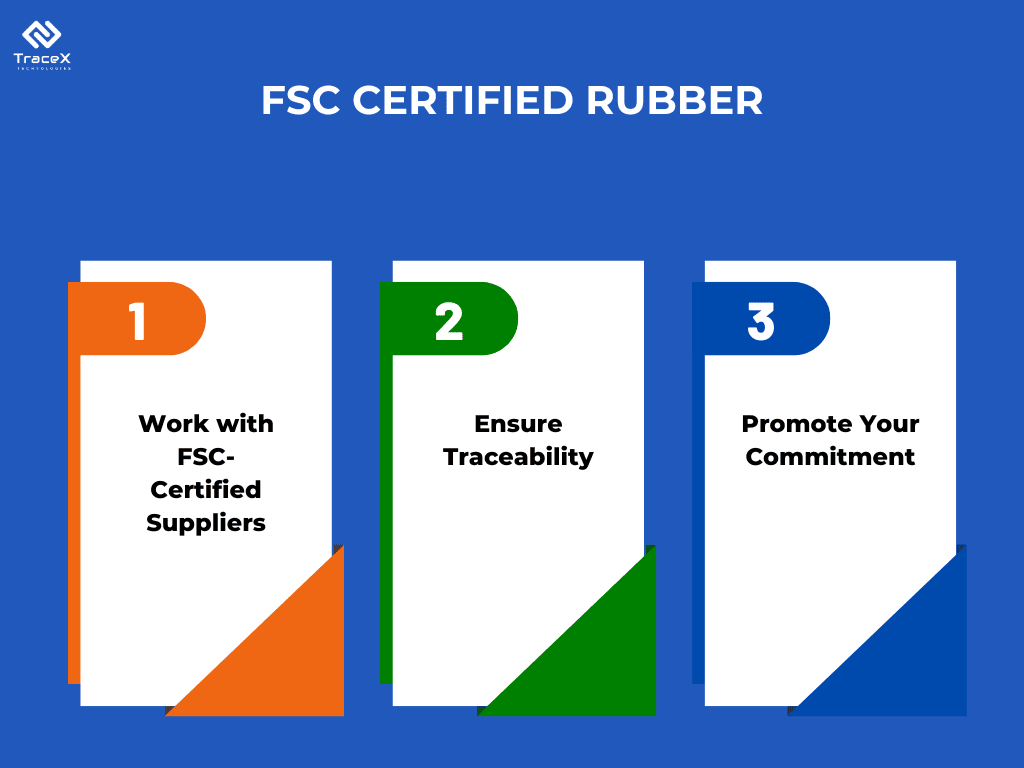Contact: +91 99725 24322 |
Menu
Menu
Quick summary: Learn how FSC-certified rubber provides sustainable solutions across industries. Explore its environmental benefits, industry applications, and why FSC rubber is the key to sustainable sourcing for businesses.

As industries face mounting pressure to minimize their environmental impact, businesses are searching for solutions that are both eco-friendly and practical. Traditional rubber production is riddled with environmental concerns, from deforestation to poor labor practices. The result? Your brand could be unintentionally contributing to environmental degradation. FSC rubber offers a way out of this dilemma.
Around 87 percent of natural rubber is sourced from the Asia-Pacific region, primarily in countries such as Thailand, Indonesia, and Vietnam, as it thrives in hot, humid conditions. The tropical forests in these regions are ecologically significant and require enhanced efforts to prevent further deforestation and the loss of vital biodiversity.
It allows businesses to embrace sustainability without compromising on quality or ethics. Curious about how this sustainable solution works and why it’s crucial for your business? Let’s dive in.
Key Takeaways
FSC stands for Forest Stewardship Council, an international nonprofit organization that promotes responsible management of the world’s forests. FSC certification ensures that products, including natural rubber, are sourced from responsibly managed forests that provide environmental, social, and economic benefits.
For rubber, this means it comes from plantations or forests where sustainable practices are used, protecting biodiversity, preventing deforestation, and ensuring ethical labor practices.
Rubber is essential to countless industries, from automotive to healthcare, and the demand is only growing. However, unsustainable rubber production can lead to severe environmental damage:
1. Deforestation: Natural forests are often cleared to make way for rubber plantations, resulting in loss of biodiversity and increased carbon emissions.
2. Soil degradation: Monoculture rubber plantations can lead to soil degradation, which affects the long-term health of the ecosystem.
3. Water usage: Intensive rubber cultivation often leads to excessive water use, depleting local resources.
4. Labor conditions: In some areas, rubber production is linked to poor labor conditions, low wages, and unsafe working environments.
By choosing FSC rubber, companies and consumers can actively participate in reducing these negative impacts.
Smallholder farmers have a crucial impact on natural rubber production, with estimates indicating that over 10 million farmers contribute approximately 85 percent of the global supply.
Additionally, the natural rubber supply chain is intricate, spanning multiple levels from forest to factory, leading to challenges in traceability. In this regard, our commitment to sourcing natural rubber produced in a responsible manner allows us to tackle environmental, economic, and social issues while supporting sustainable forest management practices.
FSC certification represents sustainable forest management and serves as a mechanism to ensure that natural rubber production aligns with social and environmental responsibilities. This certification enables businesses and consumers to choose natural rubber products that benefit both communities and ecosystems.
FSC-certified rubber is becoming increasingly important in the automotive industry, especially for tire manufacturers. As demand for electric vehicles (EVs) rises, so does the need for sustainably sourced materials. FSC rubber provides a way for automakers to meet both sustainability and performance demands.
The shoe industry heavily relies on rubber for soles, and leading brands are turning to FSC rubber to reduce their environmental footprint. By choosing FSC-certified rubber, footwear companies can ensure their products are both durable and eco-friendly.
In the healthcare sector, rubber is used for gloves, medical equipment, and more. Ensuring that these products are made from sustainably sourced rubber helps healthcare institutions meet their ethical commitments while protecting the environment.
From rubber gloves to household goods, FSC rubber is finding its way into everyday products. Consumers are increasingly choosing sustainable options, and FSC certification offers a clear indicator of responsible sourcing.
FSC certification isn’t just a label – it’s a rigorous process that ensures sustainable practices at every stage of the rubber supply chain.
1. Sustainable Forest Management: FSC sets strict standards for forest management, which include maintaining forest health, biodiversity, and the rights of indigenous peoples.
2. Chain of Custody: FSC-certified rubber follows a strict chain of custody, ensuring that FSC rubber is tracked from its source to the final product. This guarantees that no non-compliant rubber is mixed with certified batches, ensuring product integrity.
3. Transparency and Accountability: FSC certification requires regular audits and assessments, ensuring that the forests and plantations meet the required sustainability standards. This transparency gives businesses and consumers confidence in their choice of rubber.
While FSC-certified rubber presents numerous benefits, there are challenges to adopting it on a large scale:

Companies engaged in the sale of forest-based commodities within the European Union (EU) and those exporting from this market have until December 2024 to comply with the EU’s Deforestation-free Regulation (EUDR). Small and micro enterprises will benefit from an additional grace period of six months to fulfill these legal obligations.
The EUDR represents a significant legislative advancement, as it extends beyond legal compliance to include sustainability criteria. It reflects a growing recognition among policymakers of the vital importance of forests and the essential ecosystem services they offer in combating climate change and curbing biodiversity loss. Sellers under the EUDR rubber will need to demonstrate that their products are not sourced from freshly deforested areas and do not contribute to forest degradation. This presents a formidable challenge that FSC is equipping its stakeholders to overcome effectively.
While obtaining FSC certification does not exempt businesses from EUDR requirements, it provides essential guidance and access to necessary technologies, enabling effective data collection and processing to facilitate compliance.
There are six fundamental requirements of the EUDR that companies must adhere to:
1. Fulfill Legal Conditions.
2. Meet Social Protection criteria.
3. Confirm that products are free of Deforestation and Degradation.
4. Provide Geolocation data to establish material provenance.
5. Demonstrate Traceability throughout the supply chain life cycle.
6. Follow Risk Assessment protocols to devise suitable Risk Mitigation strategies.
As a leading global standard for sustainable forestry, FSC offers its stakeholders reliable certifications that align with various EUDR mandates. FSC certification already meets EUDR’s Legal Conditions and Social Protection requirements, ensuring fair wages and safe working environments while safeguarding the rights of forest laborers.
Technology solutions play a crucial role in helping businesses ensure compliance with sustainability standards like FSC certification and regulations such as the EUDR.
By integrating these technology solutions, businesses can ensure their rubber sourcing remains sustainable, transparent, and fully compliant with evolving regulations.
TraceX’s EUDR Compliance platform offers end-to-end traceability and transparency, enabling businesses to ensure their supply chains meet the strict environmental and legal standards set by the EU Deforestation Regulation. With real-time tracking and blockchain-based verification, it simplifies compliance while safeguarding against deforestation risks.
As the world becomes more focused on sustainability, the role of FSC-certified rubber will continue to grow. With rising consumer awareness and stricter regulations like the EUDR, the demand for sustainably sourced rubber is set to increase.
For businesses, adopting FSC rubber isn’t just an environmental choice—it’s a smart business decision. Not only does it reduce ecological impact, but it also strengthens brand reputation, ensures compliance with global standards, and supports the longevity of natural rubber resources.
By choosing FSC-certified rubber, businesses can play a significant role in transforming industries toward sustainability. Whether in automotive, footwear, healthcare, or consumer goods, FSC rubber offers a solution to the environmental and ethical challenges faced by rubber production. The future of sustainable sourcing starts with making responsible choices today, and FSC-certified rubber is a key step in that direction.
FSC-certified rubber is sourced from plantations that follow the Forest Stewardship Council’s strict environmental, social, and economic standards. It ensures responsible forest management, protects ecosystems, and supports local communities, making it a key solution for businesses seeking sustainable and ethical rubber sourcing.
FSC certification guarantees that the rubber is sourced without contributing to deforestation, which is a crucial requirement under the EU Deforestation Regulation (EUDR). This certification provides traceability and transparency, helping companies meet EUDR’s sustainability standards and avoid penalties.
Using FSC-certified rubber enhances a company’s brand reputation by showcasing a commitment to sustainability and ethical sourcing. It also helps businesses meet legal requirements, avoid deforestation-linked risks, and improve their environmental footprint, all while maintaining product quality.
